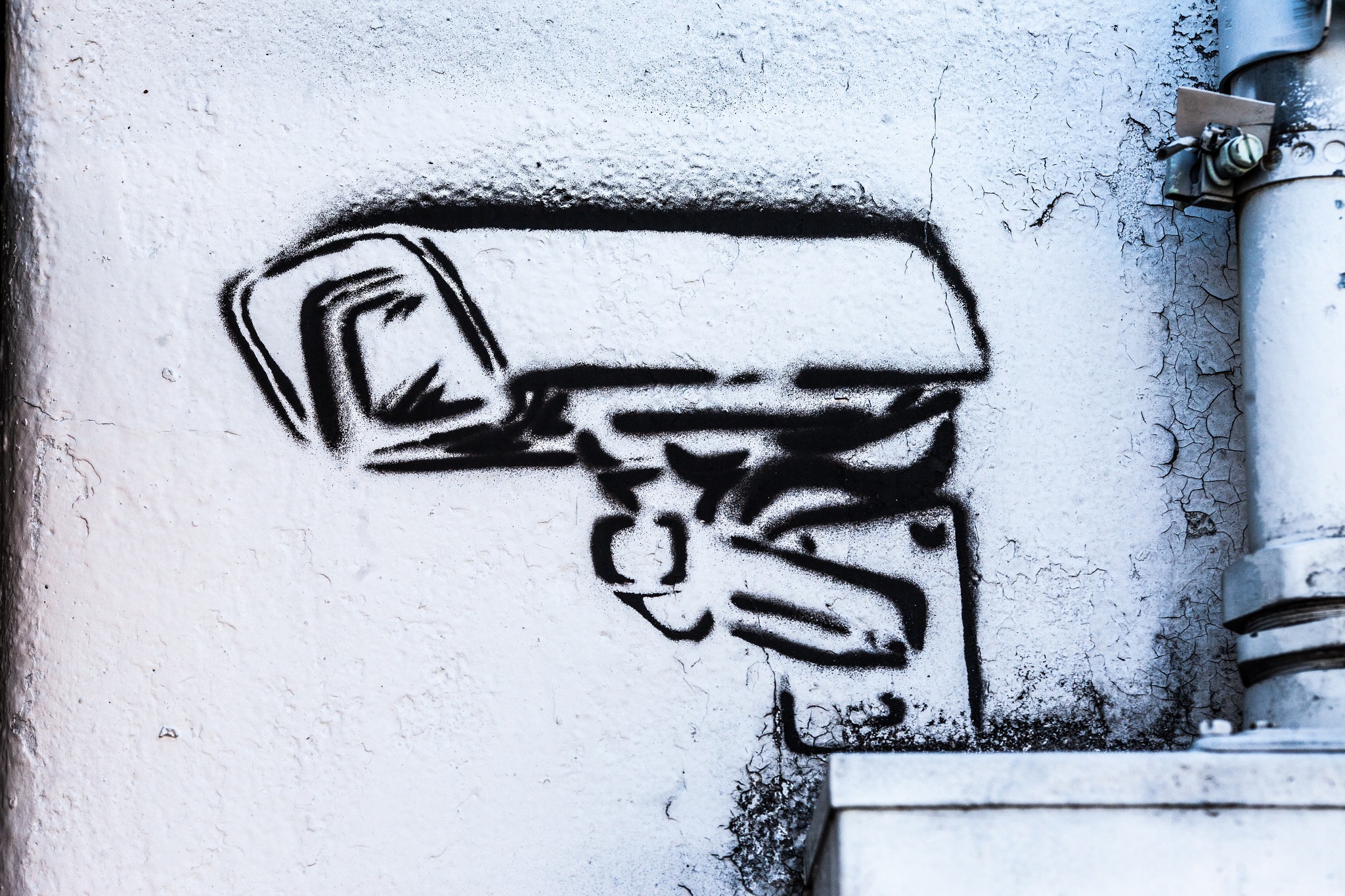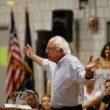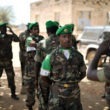Photo Credit: Thomas Hawk
For those of us who think or write about surveillance, the events of May and June 2013 represented a crucial turning point in our sense of what was possible. Edward Snowden’s release of classified documents changed the way many Americans thought about their relationship to national security agencies. It shattered the beliefs of many news consumers that their online or virtual worlds were private, protected spheres.
White progressives, notably, expressed a sense of outrage that the government had been not only spying on them, but lying about it. Activists organized to learn about encryption and online hygiene; some even mobilized to push for stricter legislation on dragnet surveillance. Their indignant sense of violation, and their proposed means of self-protection, revealed the racialized gaze through which we talk or think about surveillance in a post-9/11 world, because when they spoke about mass surveillance, only certain bodies seemed to matter.
The surveillance of American Muslims should concern us all. It is they who have experienced some of the most invasive and traumatic manifestations of the state’s gaze, and it is their “dangerousness” that has justified the broader expansion of state surveillance. So, why were the experiences and perspectives of American Muslims so absent from the eyes and ears of post-Snowden America? Why aren’t we addressing ways to protect Muslims from state intrusion? And how does ignoring what they are subjected to affect our broader understanding of the aims of surveillance, and the nature of its power?
***
Last October, I broke a story about an undercover NYPD cop, “Mel,” who infiltrated and spied on a group of young, devout Muslim women who attended Brooklyn College. Mel first entered the students’ lives in the spring of 2011, by “converting” to Islam at an on-campus event, presumably as a means of gaining the students’ trust. Over the course of the next several years, the light-skinned agent with the lilting voice wormed her way into the young women’s lives—attending Islamic study groups and social outings. She even served as a bridesmaid in one woman’s wedding.
What is it like to know someone for years and then find out that she was a spy all along? For Shereen, one of the women who knew Mel from the start, the revelations induced a kind of trauma. “For three days I couldn’t eat, sleep,” she told me. “I covered all the cameras on my phone.”
What was unusual about the Brooklyn College case wasn’t that the student group had been infiltrated—it was that the women discovered it. Muslim-Americans have long known that the FBI and NYPD use informants and undercover operatives to monitor their communities. According to a 2011 estimate published by Mother Jones, there are 15,000 FBI informants planted around the United States, many of them tasked with spying on Muslim-Americans, in addition to an unknown number of formally employed FBI and NYPD operatives.
At times, the surveillance of Muslim-American communities has made intimate personal relationships all but impossible. “There are a few of us who trust each other, and that’s good that we have each other. Some don’t even have that,” Shereen told me. “But in the back of all our minds, there’s always that suspicion, that either you are [a spy], or you think I’m one.”
It is an experience of being watched that few of us can understand. “This is what real fear of surveillance looks like: not knowing whom to trust, choosing your words with care when talking politics in public, the unpredictability of state power,” Arun Kundnani wrote in a March 2014 Guardian op-ed.
“Snowden has rightly drawn our attention to the power of what intelligence agencies call ‘signals intelligence’—the surveillance of our digital communications—but equally important is ‘human intelligence’, the result of informants and undercover agents operating within communities,” Kundnani wrote.
As noted by both National Security Agency insiders like former agent and whistleblower William Binney, and more visible NSA critics like Glenn Greenwald, it was 9/11 that triggered the expansion of the American surveillance apparatus. Mass surveillance was justified by the alleged dangers posed by Muslims. The use of informants and undercover agents is just one example of what Muslims endure.
***
“I don’t want to live in a world where everything that I say, everything I do, everyone I talk to, every expression of creativity or love or friendship is recorded,” Snowden said in a July 2013 interview with the Guardian. He speaks of himself as a citizen who believes in his right to a private self and in a democracy that fundamentally exists to protect his interests.
This perspective obscures and erases what is at stake for poor people and people of color when it comes to being watched. “When surveillance is understood as a privacy issue, namely the privacy of middle- and upper-class white Americans, it invisibilizes its violent nature,” said Lara Kiswani, the Executive Director of the Arab Resource & Organizing Center, which has run community trainings in the Bay Area about the use of informants and undercover cops. “As Arabs and Muslims we understand the current targeting of our community as a way by which the state justifies policies, practices and institutions that further criminalize black and brown communities, bolstering the attacks on historically targeted communities in this country.”
Muslim-Americans are the sacrificial lambs of our security apparatus; they are the means by which the government justifies spying on the rest of us.
While Snowden’s leaked “truths” were fixed objects—documents and slideshows— they were contextualized and presented by reporters and documentary filmmakers. If the national surveillance narrative has been “whitewashed,” did those storytellers play a part?
“The people who were telling the story were white, and they were focusing on how this happens to everybody, this impersonal surveillance that happens to everyone,” Naz Ahmad, a staff attorney with the Creating Law Enforcement Accountability and Responsibility Project (CLEAR) at the City University New York Law School, told me. “Even the term ‘mass surveillance’ glosses over and erases who has been targeted for years.”
***
Shereen never has been allowed the privilege to believe such illusions about the nature of state power. Surveillance not only determines how or when we are watched, but how the state creates and defines the object of our fear—the terrorist. Shereen understands how her government has defined her.
The Brooklyn College case was closed in early 2012, according to the NYPD. Then in 2013, the department reactivated Mel’s identity to investigative two women from Queens, Noelle Velentzas and Asia Siddiqui. In the spring of 2015, four years after Mel first appeared on Brooklyn College campus, Siddiqui and Velentzas were arrested on terrorism charges. The undercover detective appeared to have played an active role in the alleged plot.
Although the women from Brooklyn College did not know Siddiqui and Velentzas, they were deeply disturbed by their arrest. “[Mel’s] personality was very, very nice, very charming,” Shereen told me. “Had I not suspected [she was working undercover], it really scares me what kind of impact she would have had. What she could have done to me.”
Her fear was not unreasonable. In many terrorism arrests since 9/11, informants or undercover officers have preyed on vulnerable individuals, leading them to commit alleged “terror” plots that never would have occurred otherwise.
Still, media outlets continue to accept the government’s surveillance paradigm: because Muslims pose a threat, they should be watched. In fact, I was rejected by almost 10 different outlets before Gothamist agreed to run the Brooklyn College story. Several outlets told me explicitly that these women’s experiences with the NYPD did not warrant public attention.
One editor who I worked with briefly asked me to return to Shereen and my sources at Brooklyn College and ask them a question: If Mel’s presence at the college—her covert intrusion into their lives—had actually led to the arrest of “terrorists,” would they think the surveillance they had endured was justified? The fundamental assumption in the editor’s request was that the threat posed by the two arrested women was real.
While the use of informants or undercover agents is not the primary cause of every terrorism arrest since 9/11, this kind of surveillance has played a central role in “manufacturing” the very figure of the terrorist we so fear. In 2014, Human Rights Watch and Columbia Law School’s Human Rights Institute released a report documenting the abuses of counterterrorism stings.
“Americans have been told that their government is keeping them safe by preventing and prosecuting terrorism inside the U.S.,” said Andrea Prasow, deputy Washington director at Human Rights Watch and one of the authors of the report. “But take a closer look and you realize that many of these people would never have committed a crime if not for law enforcement encouraging, pressuring, and sometimes paying them to commit terrorist acts.”
In the post-Snowden era, surveillance is largely written about as a tool of social control. But there is little recognition of how surveillance is now and has always been a means through which bodies are both racialized and subjugated by the state. As Seda Gürses, Arun Kundnani, and Joris van Hoboken write in an April 2016 Media, Culture & Society Journal article: “The production of racialized subjects through surveillance has a long history, running through government censuses, police record-keeping, and colonial discourses of ‘tribal’ and ‘ethnic’ definition.”
For Muslims, surveillance does not just mean being watched—it means being fashioned into the very terrorists that the rest of us fear. “Racialization is essential to the surveillance mechanisms that are in turn intrinsic to the modern social order,” Gürses and her co-authors explain. “If we live in a panoptic society, it is also a racial panopticon.”
Muslim-Americans are the sacrificial lambs of our security apparatus; they are the means by which the government justifies spying on the rest of us. Unless we take into account the experiences of American Muslims, we will never confront the myth that is essential to our government’s crackdown on civil liberties—that the threat of terrorism is as real as the government claims, and that surveillance (“done right”) is our primary means of protection.
***
Although the story about the women at Brooklyn College was read over 11,000 times on Gothamist, one story can’t shift the national conversation on surveillance. Yet I could see the pain and hopelessness on my sources’ faces: they had shared their story, and nothing changed.
The NYPD confirmed to the media and attorneys engaged in litigation that Mel was sent to spy on the Brooklyn College students, insisting it was a legal and warranted investigation. The president of Brooklyn College did not apologize to the students nor did she admonish the NYPD for intruding so flagrantly into her students’ lives. Even in a post-Snowden world, where the word ‘surveillance’ trips across everyone’s tongue, many white Americans have few concerns about what these women endured, or for the routine practices of state surveillance that have traumatized Muslim-American communities and left young men locked up for life.
I wonder how things might be different if Shereen’s name and narrative were known in households across the nation, if she were thought of as the niqabi-wearing whistleblower who followed Chelsea Manning and Edward Snowden. My sources risked a great deal in sharing their stories for the sake of the public good. When will we recognize them as heroines?
Aviva Stahl is a Brooklyn-based journalist who writes about prisons, national security, and immigration detention.







0 Comments